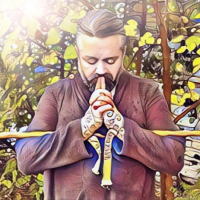- Posts: 14624
Edan`s question round: Unanswered questions of Aqua
Attachment hc895bad.png not found
As shown above, I found meditation to be a "considered thought" on a subject...
And, in my time here, I spent "considered thought" on "what exactly is meditation"....
When I did this, I decided (later) that I already meditated, just not efficiently, nor realized I was doing it, :lol:...
I "meditated" on meditation!
:lol:...
So, let me take a crack at this...
These are just my answers, just a little preface, lol... I'm still learning, and am more than willing to incorporate new knowledge as I learn it...
Are there meditation methods that are more suited for a certain kind of practice area?
Yes, I feel, in the beginning...
When learning, it will be easier in a quiet area at first because the noise of your mind and body is more than distracting, it doesn't need the help!
And, the first attempt, a few minutes will be an eternity, lol...
I am in a pretty constant state, a "walking meditation", that really doesn't need "a place", however it was suggested I also try sitting meditation...
I'm not flexible, and "lotus sitting" causes pain, and is a distraction...
So, yes, "comfortable and quiet" while learning...
And, "not really" as practice improves...
How does one knows that the chosen meditation lesson is useful enough?
How do you you know anything?
You "feel" it...
What meditation mechanics are more useful when learning a method?
-Sitting straight, but not rigid...
-Eyes closed, but not squeezed...
How to build up to a more controlled state of Meditation?
Practice...
As I said, you'll be lucky to get more than a minute...
I usually do 10-15 minutes, but, as I said, I'm in a pretty constant state, so its a "centering" I do everybso often when I'm getting mentally neat up, lol...
Are meditation methods dependent on emotional state?
Of course...
This can be "mental noise" too...
Happy? What about? Love? "Can't stop thinking about her..."
Angry? At who? "Stupid jerk cut me off!"
Worried? What about? "Will I be able to do it?"
And, mostly, in the beginning...
"Clearing your mind" isn't wiping it clean like a chaulkboard, but rather realizing all the things you are experiencing can go on hold for 10 minutes....
++++++++++++
At least, that's my thoughts...
I hope it helps..
On walk-about...
Sith ain't Evil...
Jedi ain't Saints....
"Bake or bake not. There is no fry" - Sean Ching
Rite: PureLand
Former Memeber of the TOTJO Council
Master: Jasper_Ward
Current Apprentices: Viskhard, DanWerts, Llama Su, Trisskar
Former Apprentices: Knight Learn_To_Know, Knight Edan, Knight Brenna, Knight Madhatter
Please Log in to join the conversation.
~ Aqua
Please Log in to join the conversation.
- Breeze el Tierno
-

- Offline
- User
-

- Posts: 3208
Please Log in to join the conversation.
Cabur Senaar wrote: I can tell you that meditation is not useful as a theoretical exercise. No use talking or thinking about it. It is understood best through experience. Practice sincerely, reflect afterwards. Being clever isn't useful here.
Why not? I find talking useful, did not ask for cleverness
Please Log in to join the conversation.
- steamboat28
-

- Offline
- User
-

- Si vis pacem, para bellum.
I would disagree with this, Connor. I don't believe meditation can be taught. It can be explained and experienced, and even guided, but you cannot teach it any more than you can teach music. I can show you where to put your hands on the keyboard to make noise, but it's up to you to arrange that noise into something original if you truly want to understand it.Connor L. wrote: How does one knows that the chosen meditation lesson is useful enough?
You should consult a meditation teacher. Never go off what you hear on an internet forum. Find people who are skilled and experienced in teaching meditation, and they can guide you.
Meditation is very useful in emotional control. It can induce any emotion you've ever experienced, provided you consciously move yourself to that emotion. It's been very helpful for me in both my acting and my private life, where I suffer a few emotional imbalances.Are meditation methods dependent on emotional state?
Some may be. But, mine, no. In fact, I am encouraged to sit with my emotions in meditation. Observe but do not engage them. We bring with us whatever we experience to the cushion!
[hr]
I touched on this in my Journal in post #99223 , " The Problem With Meditation ." Meditation is a mindset, not a singular activity. All the tools and practices and "mechanics" we use to lead us there are just the crutches we need to walk the path.Rosalyn J wrote: Meditation (to me) is not so much a thing that we "do" some time during the day, adopting certain postures in certain places for a certain amount of time to attain a certain goal. It can instead be considered "mindfulness", that is to say NOT living on autopilot. Not simply "doing", but really doing...We've got this wonky idea that meditation is sitting down crossed-legged and clearing our mind and breathing and maybe using some beads or some music or whatever for about 10, 20, 30 minutes, or 1 hour. But these, even the sitting down and the time are aides in the practice and should not be confused for the practice itself. The practice of meditation should be a now...now...now...now thing in which you ask yourself, "Am I awake?"
Though I call them "crutches", there is nothing shameful about their use, and I'm not suggesting you should eschew them. I'm merely stating that they "hold us up" while we learn what meditation really is. I would encourage everyone to sample the many, many meditation methods and aides available to them. Meditation is much like language in this way. Someone who learns one or two languages knows those one or two languages, but someone who studies many languages begins to understand the underlying principles of what language is, and the rules of how it works. By studying one or two meditation methods, you might understand those methods, but by studying many, you will understand meditation.
A.Div
IP | Apprentice | Seminary | Degree
AMA | Vlog | Meditation
Please Log in to join the conversation.
Thanks for taking the time to respond. I would like to clarify. Maybe when I say "teacher", I am using a casual definition. What was important to me was the second part. This:
Find people who are skilled and experienced in teaching meditation, and they can guide you.
Emphasis on guide. Just like you say in your response.
I am curious though... Why is what you say anything different from math or history? Do we not also have to "arrange that" information".. "if [we] truly want to understand it?" I think we can take it farther and say that nothing can be "taught". Things can only be learned and put into practice. I believe all academic subjects become art at some point. History, math, rhetoric, all of it.
So, I think you've picked apart my words instead of understood the spirit of them. While it is on me to clarify more and be more specific, I think the meaning can be gleaned fairly easily with some thought on the receiving party's end.
As for your second comment, I think that it's wonderful what meditation can do for all aspects of our lives. I am slightly put off by the idea of engendering emotions in meditation, but I can see how that would be useful to you. Thank you for sharing that private detail.
Please Log in to join the conversation.
Please Log in to join the conversation.
Granted, one could be doing something other than a mindfulness practice and have a technique for a different "kind" of meditation altogether.
I'm not sure what I'm saying. But, Tolle seems to be saying that there really is only one goal. And, everything else is "mind" or "thinking" about things. Once achieving that "no mind" as the Zen say, there is no technique left needed.
Please Log in to join the conversation.
Please Log in to join the conversation.
Please Log in to join the conversation.
